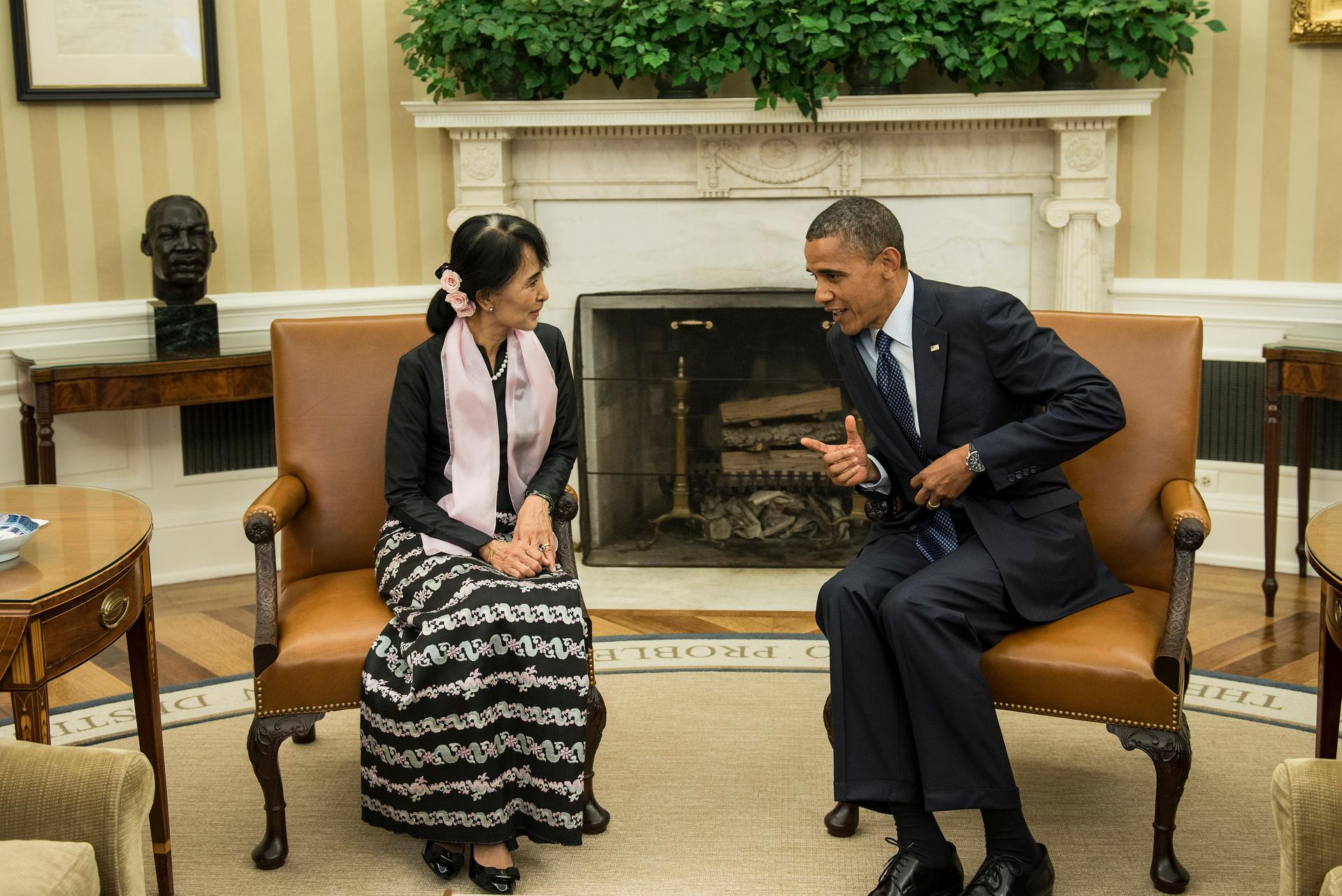Is President Obama’s visit to Myanmar premature?
US President Barack Obama listens to Myanmar’s Aung San Suu Kyi speak before a meeting in the Oval Office of the White House September 19, 2012 in Washington, DC.
President Obama has announced that he will visit Myanmar, formerly known as Burma, on his tour of Southeast Asia at the end of this month. Obama will be the first sitting US president to visit the Southeast Asian nation.
The president’s visit will be the strongest endorsement from the international community since Myanmar’s government began a democratization process last year. But critics are calling the visit premature. Despite Sein’s reforms, which have minimized media censorship, strengthened local currency and initiated peace talks with rebel groups, much of Myanmar remains unchanged.
Since President Thein Sein came to power in March 2011, the country has undergone a gradual transition to a civilian parliamentary system after decades of military rule. The US has responded to Myanmar’s democratic shift with an easing of economic sanctions, and according to the LA Times, since Suu Kyi visited the US in September, relations between the two countries have improved significantly. Obama will meet with both opposition leader Daw Aung San Suu Kyi and President Sein to encourage Myanmar’s ongoing democratic transition.
But the Burmese exile group, US Campaign for Burma, has urged Obama to postpone his visit because it sees a need for more substantial changes in the government’s human rights efforts. Aung Din, the group’s director, claims that more progress needs to be made.
“This government has continuously failed its own responsibilities in serving the people of Burma,” he said.
Sein’s government released more than 500 political prisoners in September, but hundreds more remain under detention. The country’s judiciary is still not independent, and the military remains “above the law and dominant in the country’s political affairs with supreme powers,” Din told the New York Times.
More recently, violent sectarian conflict between Royingha Muslims and Buddhists has plagued Myanmar’s western Rakhine state. Following the rape and murder of a young Buddhist woman in May, communal conflict erupted in Rakhine and continued for weeks, causing the deaths of more than 90 people, the BBC reported. Sein declared a state of emergency in June and in announced in a televised speech that the persistence of violence could severely threaten the nation’s democracy and stability.
A black mark on the government’s human rights record, hundreds of Rohingya Muslims remain unrecognized by the state. Officials have reportedly blocked humanitarian aid to Rohingya groups in need and have done little to help both Buddhists and Muslims affected by the violence.
Additionally, military intimidation and occupation in the northern Kachin State have raised questions about the country’s progress. While the rest of the country participated in Myanmar’s historic elections last April, there were no polls in the Kachin state because of reported “security concerns”. A series of bombings and mysterious arrests have displaced thousands of residents of Kachin villages.
The government’s failure to address the region’s constant electrical blackouts, high unemployment rates and military violence contrasts the public narrative of Sein’s progressive reforms. The Economist reported in September that the military continues to rape and torture villagers, trains child soldiers, and frequently forces civilian military participation.
Obama, Thein Sein, and Suu Kyi may also discuss the Rakhine state violence. Suu Kyi released a statement on Thursday urging more troops to be deployed to manage the conflict. Analysts have said that the Obama administration hopes that the visit will bolster the US relations with Myanmar and will consolidate Sein’s recent reforms.
“We think the visit is a bit premature,” Phil Robertson, deputy Asian director of Human Rights Watch, told the LA Times. “What is actually the rush?”
More from GlobalPost: Burma Road: China's soft power in a new Myanmar
Our coverage reaches millions each week, but only a small fraction of listeners contribute to sustain our program. We still need 224 more people to donate $100 or $10/monthly to unlock our $67,000 match. Will you help us get there today?
